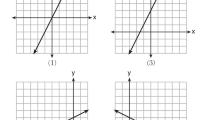Abstract
This paper addresses the problem of determining the number of items in a test and the cutting score to make a binary decision on mastery with prescribed precision. Previous attempts to solve this problem have been based on simplistic models assuming all-or-none knowledge. The same approach as in those papers is adopted here, but from the standpoint of a finite state model of test behaviour. The required number of items is shown to be smaller than previous results suggested. In contrast with previous attempts, this method is applied to true-false and multiple-choice tests responded to in the conventional mode, and to multiple-choice tests responded to in answer-until-correct and Coombs’ modes. The effects of varying guessing behaviour on the part of the examinees are also studied. It is shown that the smallest number of items needed to make a mastery decision with a predetermined error rate occurs when the testees respond without guessing. This behaviour is unlikely to be followed by examinees, but it is also shown that this lower limit can be reached at by administering multiple-choice tests under Coombs’ response mode.
Access this chapter
Tax calculation will be finalised at checkout
Purchases are for personal use only
Preview
Unable to display preview. Download preview PDF.
Similar content being viewed by others
References
Bliss, L.B. (1980). A test of Lord’s assumptions regarding examinee guessing behavior on multiple-choice tests using elementary school children. Journal of Educational Measurement, 17, 147–153.
van den Brink, W.P., & Koele, P. (1980). Item sampling, guessing and decision-making in achievement testing. British Journal of Mathematical and Statistical Psychology, 33, 104–108.
Coombs, C.H. (1953). On the use of objective examinations. Educational and Psychological Measurement, 13, 308–310.
Coombs, C.H., Milholland, J.E., & Womer, F.B. (1956). The assessment of partial information. Educational and Psychological Measurement, 16, 13–37.
Cross, L.H., & Frary, R.B. (1977). An empirical test of Lord’s theoretical results regarding formula scoring of multiple-choice tests. Journal of Educational Measurement, 14, 313–321.
Fhanér, S. (1974). Item sampling and decision-making in achievement testing. British Journal of Mathematical and Statistical Psychology, 27, 172–175.
Frary, R.B. (1980a). The effect of misinformation, partial information, and guessing on expected multiple-choice test item scores. Applied Psychological Measurement, 4, 79–90.
Frary, R.B. (1980b). Multiple-choice test bias due to answering strategy variation. Paper given at the Annual Meeting of the National Council on Measurement in Education, Boston, MA.
Frary, R.B. (1982). A simulation study of reliability and validity of multiple-choice test scores under six response-scoring modes. Journal of Educational Statistics, 7, 333–351.
García-Pérez, M.A. (19851 A finite state theory of performance in multiple-choice tests. Proceedings of the 16 u1 European Mathematical Psychology Group Meeting,Montpellier, France, 8–11 September. Pp 55–67.
García-Pérez, M.A. (1987). A finite state theory of performance in multiple-choice tests. In: E.E. Roskam & R. Suck (Eds.), Progress in Mathematical Psychology-1, 455–464. Amsterdam: Elsevier.
García-Pérez, M.A. (in press). A comparison of two models of performance in objective tests: Finite states versus continuous distributions. British Journal of Mathematical and Statistical Psychology.
García-Pérez, M.A., & Frary, R.B. (in press). Psychometric properties of finite state scores versus number-right and formula scores: A simulation study. Applied Psychological Measurement.
García-Pérez, M.A., & Frary, R.B. (1989). On the mathematical form (and psychological justification) of item characteristic curves. Manuscript submitted for publication.
Gibbons, J.D., Olkin, I., & Sobel, M. (1979). A subset selection technique for scoring items on a multiple choice test. Psychometrika, 44, 259–270.
Guion, R.M., & Gibson, W.H. (1988). Personnel selection and placement. Annual Review of Psychology, 39, 349–374.
Hogg, R.V., & Tanis, E.A. (1977). Probabilityand Statistical Inference. New York, NY: Macmillan.
Lord, F.M., & Novick, M.R. (1968). Statistical Theories of Mental Test Scores. Reading, MA: Addison-Wesley.
Shepard, L. (1980). Standard setting issues and methods. Applied Psychological Measurement, 4, 447–467.
Weiss, D.J., & Davison, M.L. (1981). Review of test theory and methods. Research Report 81–1. Minneapolis, MN: University of Minnesota, Department of Psychology, Psychometric Methods Program.
Wilcox, R.R. (1976). A note on the length and passing score of a mastery test. Journal of Educational Statistics, 1, 359–364.
Wilcox, R.R. (1987). New Statistical Procedures for the Social Sciences. Hillsdale, NJ: LEA.
Author information
Authors and Affiliations
Editor information
Editors and Affiliations
Rights and permissions
Copyright information
© 1989 Springer-Verlag Berlin Heidelberg
About this chapter
Cite this chapter
García-Pérez, M.A. (1989). Item Sampling, Guessing, Partial Information and Decision-Making in Achievement Testing. In: Roskam, E.E. (eds) Mathematical Psychology in Progress. Recent Research in Psychology. Springer, Berlin, Heidelberg. https://doi.org/10.1007/978-3-642-83943-6_16
Download citation
DOI: https://doi.org/10.1007/978-3-642-83943-6_16
Publisher Name: Springer, Berlin, Heidelberg
Print ISBN: 978-3-540-51686-6
Online ISBN: 978-3-642-83943-6
eBook Packages: Springer Book Archive




